Coffee Conversations - The IRE is Coming in HOT! - PODCAST TRANSCRIPTION
February 21, 2023 at 11:40 a.m.Editor's note: The following is the transcript of an live interview with IRE Keynote Speaker Chris Czarnik, Kelly Van Winkle, Roofing Alliance president, Luciano Perez, safety director at KPOST Roofing and Waterproofing and Jason Stanley, president of IB Roof Systems. You can read the interview below, listen to the podcast here, or watch on Youtube.
Heidi Ellsworth: Good morning, everyone. My name is Heidi Ellsworth and this is Coffee Conversations from RoofersCoffeeShop. We're so happy to have you all here today. Welcome 2023, this is our first Coffee Conversations of the year. We are so excited and, of course, we had to start it out talking about the International Roofing Expo. There is so much going on, I can't wait for the first week of March and we want to share that excitement with you today. We have an amazing panel.
We're going to share all of the hot, fun, educational, great things that are going to be happening at this year's IRE. But before we get started, I want to remind everybody that this is a chat, this is a conversation. I already see people chatting, so please get into that chat. If you have comments or questions, don't wait till the end. This is all the way through, so we're going to want to hear what you think. If you have questions as we go along, this is being recorded and it will be on demand within the next 24 hours.
Feel free to share that with the rest of the industry, because we want to get the largest attendance at the IRE ever, so let's work that out. Please share this out because this is where the roofing industry all comes together and it's going to be in Dallas, Texas this year. Let's get started. First of all, I would like to say thank you very much to IB Roof Systems. They are the sponsor of this Coffee Conversations today. I tell you what, an amazing company and I'm not just talking about their products.
I'm talking about what they do for the industry. We are so honored to have Jason Stanley on this panel with us today, the CEO of IB Roof Systems. Thank you, Jason, for sponsoring and for everything you do for the industry.
Jason Stanley: Thank you, Heidi. Proud to be here and proud to be a sponsor.
Heidi Ellsworth: We are proud to have you. Let me tell you, we have so much fun working together, doing the great things on this. You are not going to believe, everyone, what you're going to hear is going to be happening. A lot of that is coming from great manufacturers like IB Roof Systems. As we get started, first of all, I would like to introduce our panel.
I'm telling you, this is really great. This gentleman, our first panelist, I was actually lucky enough to be able to see pre-COVID at a Roofing Alliance meeting. I was blown away by his insights and his wisdom when it comes around recruitment and just the labor workforce. Chris, welcome to Coffee Conversations.
Chris Czarnik: Well, gosh, good morning. I'm so grateful to be here and it's important for everybody on this call to know that I am specifically connected to the roofing industry. I travel the world teaching companies how to recruit, retain, and develop talent with process-oriented solutions that they can implement and start enacting tomorrow. But the vast majority, the beginning of my work started with the roofing industry. A very good friend of mine, who many of you I'm sure know, Reid Ribble, was my congressperson.
Reid is the one who identified my work and got it in front of Congress. Then, when he left Congress as the president of the National Roofing Contractors Association, actually asked me to write the book, Winning the War for Talent, which is the book that is currently being sold all around the world in a way I was never prepared for. Anyway, he said, "Chris, you've been helping jobseekers find companies for the last 20 years. Can you teach my companies to actually go out and find people, and bring them into the organization?"
He hired me to write the book, Winning the War for Talent, and that was the beginning of all of this. I am very grateful for the opportunity to be here, and blown away by the opportunity to keynote this presentation.
Heidi Ellsworth: I tell you what, we're going to introduce Brandi in just a second, but I have to give huge kudos to Informa and the IRE to bring you in, Chris, because this is the type of conversation we need to have.
We need to be talking about the labor shortage and what's happening, so really excited. We're going to get back to you because we're going to talk all about your keynote, so I'm really excited. Thank you for being here.
Chris Czarnik: You bet. My pleasure.
Heidi Ellsworth: Next needs very little introduction, but I would like to introduce Kelly Van Winkle, who's going to be here talking about all the great things that are going to be happening at IRE around The Roofing Alliance. Kelly, can you just introduce yourself real quick? That would be great.
Kelly B. Van Winkle: Yes. I'm Kelly Van Winkle with King of Texas Roofing Company right outside of Dallas. I'm also The Roofing Alliance president for this year. We have an exciting organization in the alliance and we're going to be very active at the IRE.
I think this is going to be one of the best IREs we've had in many years. We have a lot to tell you about, and thanks for coming to our webinar today. Thank you, Heidi, for having me as a panelist.
Heidi Ellsworth: Always an honor, Kelly. I always love it. We introduced you just a little bit before, Jason, but Jason Stanley with IB Roof Systems, a huge advocate of ProCertification. Jason, if you could introduce yourself and your company, that would be great.
Jason Stanley: Certainly. I'm the youngest of the second generation of the Stanley family. I'm running a family-owned business called IB Roof Systems. We're a PVC, single-ply roofing manufacturer, and also the founder of a company called Labor Central. There seems to be three major issues in our industry today, and they are labor, labor and labor. If anyone's attended Roofing Day, there's three different talking points. We all come together with one voice, but they all center around labor.
I'm a huge advocate for the worker on the roof. Growing up in the roofing industry and being on the roof in my teens, I know far too well the hard work that it is to install roofing materials. I have a bleeding heart for these guys that are up on the roof killing it every single day. When I became a board member of the NRCA, I learned about ProCertification. This is it, this is our ticket to share this credential. The first time we've really had any credentials in the roofing industry.
It's there for the taking. We need to get this out to the community. I've become very passionate about the benefits of ProCertification. Actually, having an installer or roofer say, "I'm not just a roofer. I'm a card-carrying, pro-certified, single-ply installer or a standing seam installer, or a comp shingle installer and actually have some certification, some authorization that says I'm capable and confident to do this." But then it also has a level of safety.
At every one of these ProCertification starts, there is a safety component that goes with it, which is so neat in our industry. It's a hard and also dangerous industry if you're not safe.
Heidi Ellsworth: Okay. Jason, thank you. I know you're going to be back, just a little bit of a slow internet there.
Jason Stanley: I froze.
Heidi Ellsworth: I know. Thank you, Jason. We're going to go on and I'd like to introduce Luciano Perez with KPost Roofing & Waterproofing.
Luciano, thank you so much for being here. You are going to bring so much amazing information about safety, and the Latino community and roofing. Please introduce yourself and your company.
Luciano Perez: Yes, thank you. Thank you for having me. I'm Luciano Perez with KPost Company in Dallas, and I've been in the industry for about I think 31 years now. Started out in the roofing industry, and then I moved into the safety side of the business. We're going to be talking, we're going to be focused on the IRE. By the way, this is the first time that we are navigating in this area, who are the Latino community or Hispanics.
Jason, you mentioned the word safety, I am the safety, OSHA training and everything in between, communication and everything. We're going to be talking the traits of a good safety leader or manager. If you are leading people within your company, we're going to be talking in a group of panelists in the areas of communication and culture. Again, it is going to be nice. [inaudible 00:08:55].
Heidi Ellsworth: That's excellent. Yeah, we're going to talk more about that. I'm so excited for that class and for everything that is going on at the IRE. Really no introduction needed, but I would like to bring Brandi on to talk about everything that's going on.
Brandi is everything you see that is amazing with the IRE, is going to be coming because of the classes and the work, and the time that this lady puts in to really making this event truly phenomenal. Brandi, if you could introduce yourself and your company. Then let's get right into talking about what's going to be happening at IRE.
Brandi McElhaney: Okay, sounds good. Thanks, Heidi. I'm Brandi McElhaney and I'm the senior conference manager for the show. I do the conference program as well as the keynote, as well as the Community Service Day. Getting back to Chris, because labor is the critical issue in the industry, we thought the industry would be better served to have instead of this generic, inspirational, motivational talk for the keynote. We're like, "Hey, let's talk about the real issues and try to gain momentum in this initiative."
We're very thankful for Chris to share his knowledge with us. Gosh, all things IRE, we probably would be an hour just me chatting about everything that's going on. But briefly, we have our 14th Annual Community Service Day that takes place the day prior to the show. Sika Sarnafil is sponsoring that as well as GAF. Gosh, there's so many, OMG Roofing, SupplyPro, Carlisle, CentiMark, there's just so much excitement around this event. We're adopting three homes, and GAF is helping us replace roofs on several of the homes.
We're very excited about this initiative, so we would love for you to join us. It's truly an amazing, amazing day. That's the day before the show and then we kick off Tuesday morning with some conference sessions. We have 45 conference sessions over three days. Then prior to the show opening, we will hear Chris talk about the labor workforce initiatives development. Then that evening we will have our welcome party at House of Blues. Yes, House of Blues, sorry.
Prior to that, we have our first-timers reception prior to the welcome party, so we welcome those folks. Heidi, I know RoofersCoffeeShop has sponsored that event. We welcome our new timers to the show and help them navigate.
Heidi Ellsworth: Yeah.
Brandi McElhaney: It's amazing. The welcome party is super fun as well. Tuesday and Wednesday we have more educational programs. As Luciano said, he's going to be doing a talk on the Hispanic workforce and communicating with them about safety. Speaking of that initiative, Jason and I spoke the other day about his Labor Central platform.
And bringing in more Hispanics in the industry and introducing them to the show, because historically we haven't been able to capture that audience. We're super excited about that initiative. Gosh, there's so much more, but I don't want to take up all the time.
Heidi Ellsworth: Well, there is so much more. Brandi, thank you for all you do. Really, I can't say it enough how much you do, and the quality of the education and everything. I do want to please, everybody ask questions. We've already got some chats going on. As we go through, if you have any specific questions, we are going to cover the whole week.
But we're getting each one of our panelists to help with that. We're going to get started, first of all, and talk about the amazing keynote speaker that we have this year. Chris, talk to us, give us just a little teaser, so everybody out there, make sure that they're sitting in that audience for that keynote.
Chris Czarnik: Sure. Well, again, I'm grateful to be there, but we're not just going to talk about the problem. Everybody knows that there's a problem. I don't have to convince anybody that there's a labor shortage. Again, the math is absolutely certain. It is a mathematical certainty that across America, we are eight million people short for the next 10 years. Yeah, for the next 10 years. But specifically for roofing, I want you to think about for a second this idea that when people don't come to us.
In the past for the last 40 years, we posted a job ad, a line form, and we got to choose. Now when that's not happening, we start to blame the jobseekers. We start to say, "Well, nobody wants to work and everybody's lazy. All those darn millennials went to school for their French art degree, and now they're living their parents' basement delivering pizzas to each other through GrubHub." Just please stop. The example I use all the time is if you went fishing and you didn't catch any fish.
And you walked around blaming the fish, people would laugh at you. We would never in a million years, not have enough sales and blame the potential customers who weren't coming to us. For 40 years we posted a job ad, people came and we got to choose. Well, I hope you enjoyed that. For the next 10 years, we have to compete. The good news is we're really good at competing. Roofing companies know how to compete because you have been winning new roofing customers your entire business career.
What I'm going to teach you is to use some of those ideas that you are already very, very good at and apply them directly to recruiting. Remember, the image I want everyone to have this morning, when you start seeing all those things that are on the news, nobody wants to work, everybody's lazy. Two things are really important for you to understand. Number one, nobody sees commercial roofers. Why? Because they're four stories up. People go to Taco Bell because they go to Taco Bell and they see a now hiring sign.
They go into Kohl's and they end up folding sweaters because they shop at Kohl's. We go to work at places mostly because my jobseekers have never been taught ever how to figure out where they belong in the world of work and how to find it. Normally what happens is people go and apply for jobs that are right in front of them. Now tell me the last time that people saw a roofing crew? They don't, they're four stories up. Second of all, show me one TV or movie that shows roofing or manufacturing as a whole in any positive light.
See, it's up to us, if we don't change that view and the ProCertification thing is an enormous leap forward. I can't even begin to tell you how proud I am of this industry to coming to that, because I was the career services manager for the largest technical college in the state of Wisconsin. People came to my college to get certifications to hold up and say, "Look, I have value. Look, I can solve problems. Look, I'm worth talking to and really worth hiring for your organization."
For the first time ever, you guys are taking that step, which is enormous. What I want to teach everybody in that office is how to get great people by their personality type, by creating personas of the person that wants and needs this job, by their hobbies. By their personality type, what jobs that they're currently in today that they're probably unhappy in. I want you to be able to go market to them the exact same way that you market your products and services to companies around the country.
Once you realize that your company's already good at it, this light will go on and you're like, "Wait a second, we got to stop waiting for people to come to us. It's time for us to go to them."
Heidi Ellsworth: Yeah. Yeah. Chris, I just love that. Did you see all of us? We were all like, "Yeah, keep going." We're all going to be in the front row.
Chris Czarnik: People are literally going to walk away with two lunch and learns that they can recreate in their conference room the next day if they choose, in order to start this process. But I want to move on to the rest of it, because I super want to hear what's going on with everybody else. But just if you ever wonder whether there are great people out there who will show up for this great opportunity, remember that this morning in your hometown, some 20-year-old male or female.
Some 20-year-old got up and got on the back of a hot tar truck to go seal parking lots and driveways for $14 an hour, 20 hours a week with no benefits, no health insurance, no development opportunities. They get burned every other day. They're doing work that is hard, that is laborious, that has them in danger every day. Ask yourself, "Why is that person in that job? Do they want to be in that job or would they much rather?" Listen, we have way better jobs, whether better pay and better benefits.
If that person is showing up for a job way worse than ours, what would they do for us? But we got to put it in front of their nose.
Heidi Ellsworth: I think, Chris, as you're talking about that too and this is something that we are seeing has totally, I don't want to say changed because it's always been the most wonderful industry, but it is becoming more and more inclusive. To really look at, like you said, put it in front of people, invite them in, come be with us.
This is a great industry. I think that's probably more so than ever in the Latino community. Luciano, you're going to be doing the same thing, talking about the workforce, about safety. You're going to be leading, I think Brandi, isn't it one of the first panels of this kind, right?
Brandi McElhaney: It sure is. Yes.
Heidi Ellsworth: Yeah, this is groundbreaking. Tell us about your panel, about the people who are going to be doing the education, and the overall how we are embracing and inviting the Latino community.
Luciano Perez: Yeah. Thank you, Heidi. Chris, as far as bringing the people, once we have them in the house and then not the challenge, but the process. I guess part of the process is to get them to working safe, because the roofing industry nationwide has been in the eyes of OSHA for many years. I see more, and more and more wiring lines and safety-related items up on the roofs. But still we have a number one cause of incidents and injuries is for protection.
The panelist session is not a training class, but we are going to cover things like communication skills. You are the safety leader. What are the traits of a highly effective safety leader or professional? One of them will be communication. Okay, how do you use communication in an effective way? One of my panelists, it will be a panelist, he said, "I worked throughout the United States and the people in Texas or North Texas is different. I went to open a branch in New York and we had people from Central America, Columbia, Cuba, Puerto Rico, and other countries and Vietnam."
He said, "Imagine the challenge to communicate?" Yes, they're going to be productive and we want it to be productive, but also we want it to be safe. Safety or the risk management is part of all this conversation. Yes, we want the manpower in the industry, but we need also to work to provide the training and everything education toward safe. We're going to cover they listen and how important is the listening skills?
Heidi Ellsworth: Yeah, listening and communicating.
Luciano Perez: Listening and communicating, that type of, like you say, Heidi, this is a conversation, this is not we're going to grill all the panelists, we're going to put them on the spot. No, this is the challenges. One safety professional here in Dallas said to me, "I speak Spanish with the guys, but I don't feel that I connect." I don't feel is keyword, feel. "I tell them, but I just don't feel that they connect with me or I connect with them."
What do you do? That's a million-dollar question. We're going to be talking that type of conversation is going to be related of culture. Heidi, I mentioned with you when you were [inaudible 00:22:00], I talked briefly with you about people from the north of Mexico versus people from Mexico City. Same country, just one country, but the approach is just different.
Heidi Ellsworth: Yeah. Well, when we look on the United States, all we have to do is look inward, it's no different. People from the Pacific Northwest compared to Florida, we do things different. We have different terminologies, but we're all together. We just have to listen and learn the different cultures.
I think it's just amazing that you're going to bring all these people to have that conversation. This is one of the mini classes, what I think Brandi said 45 classes that are going to be there. But everyone who's on this, and as you're talking to people, you want to get registered for these classes because they're going to sell. Luciano, your class will be packed.
Luciano Perez: Yeah. Well, another point also on the same topic, he'll say, "Well, I tell them and tell them, and they don't listen. My people, I tell them. How do I make them to listen?" Well, that's a good question.
Well, go to talk to them. I already talked to them. I talk Spanish, I tell them, and I just don't know what else. We're going to get the tips from different panelists in this session. We're going to network with each other and it's going to be a good conversation.
Heidi Ellsworth: That is excellent. Chris, you're seeing this across the country too in all industries, right?
Chris Czarnik: Well, I definitely have. And not only that, but Luciano's really onto something here is that once we get people into the industry, they want to learn and they want to grow. We've got to be able to have education, experience and hand down knowledge that allows people to become a crew leader, that allows somebody to become a safety leader in the organization.
Those skills of convincing people why something's important, don't do it just because I, as your boss told you to do it. Do it because it's good for your safety and we want you to go home with 10 fingers and 10 toes tonight to your family. Those are the skills that we can develop inside our employees, to get them to grow in the organization so they stay in the industry.
Heidi Ellsworth: Yes. Yes. That is what this is all about. We started talking at the beginning of this part about inclusiveness.
Last year, was the first year that there was a full pavilion on the show floor, Para Latino brought to by SRS. It was amazing. Brandi, that's happening again this year also, right?
Brandi McElhaney: Yes.
Heidi Ellsworth: There's going to be a number of opportunities to listen and to mingle, and to have conversations, whether it's in Luciano's class or at the lounge.
Brandi and Jason, you mentioned right at the beginning, about this initiative out through Labor Central to also communicate and invite. I always say people need to be invited. How's that working, Jason?
Jason Stanley: Well, this platform that we have, Labor Central, has nearly 1,500 crews across the country, and we can text them and connect with them in both English and Spanish. The intent here is to try and bring this group, these laborers that work so hard that do a large part of the installations today, to bring them into the roofing industry. It seems as if they all learn on the job, and they learn from the person before them and the person before them.
But there are so many incredible tools that have been prepared. Millions of dollars that have been spent by manufacturers, the NRCA, The Roofing Alliance in both English and Spanish that are there for the taking, but we can't deploy the content because they don't even know it exists. For the first time really, we want to make a huge push to bring people to the IRE that actually work on the rooftops. Maybe they're not bilingual, maybe they only speak Spanish, but make them feel comfortable.
SRS has done an incredible job with this Para Latino booth for the first time, or maybe it's the second show. But the first time in Dallas, having a place where these people can go and can feel at home, can share their stories and their history, and feel some comradery in the industry. I believe they will be amazed when they get there to see this incredible industry that is there for them with open arms that they really don't have access to.
My hope is that through Labor Central, we can start to connect with these folks and bring them out of the shadows, and truly into the industry where they can get all this amazing content, whether it be safety, whether it be installation training. Whether it's just about just being a better worker and understanding how to progress. Again, hats off to SRS, they're putting their money where their mouth is. They have Julissa Chavez there who is traveling around the country speaking, trying to bring these people up.
What she's finding is some of them don't want to own their own roofing company. Many of them want to just be more productive. Hopefully through Labor Central and partnerships with SRS and the Para Latino push, we can accomplish that, and truly empower these people and educate these people so that they can be happier, more productive, and more successful.
Heidi Ellsworth: Yeah. I'm so glad you called out Julissa because she is just talk about a leader in our industry, she is phenomenal. I do want to also say, Theresa, thank you for this great comment. She said, "Empathy is one of the best feelings you can have with your workers. The diversity in the Hispanic community is huge. We have many different cultures." This, again, IRE is going to be right on topic. This is exactly the conversations that we're going to be having while we're there. On that note, let's talk about the next generation.
We have the next generation that we want too. Here is the Para Latino lounge. I just want to make sure everybody saw that. But the next generation is all about our young folks coming in to the industry. I have to tell you every day, I'm so proud that Megan Ellsworth is part of the roofing industry, who I don't know if she ever thought she was really going to be, but she is. We're bringing young people in every single day. Kelly, The Roofing Alliance has been doing the student competition.
I think this is the ninth year. It is absolutely one of my favorite things. Let's tell everybody and see if we can get them into that room.
Kelly B. Van Winkle: Yes. Well, first I wanted to commend all the other panelists on everything that they're doing to bring in new people to our industry. It is so important, all the things that we're talking about here today. The Roofing Alliance highly believes in bringing in the younger generation, a diverse generation, bringing in fresh, new ideas. One thing that we've always done historically, is have scholarship programs for younger folks to go to trade schools, vocational schools, college and university.
In the last few years, what we've been doing also is partnering with construction management schools at universities across the United States. So many of the top construction management programs and really partnering with them to develop curriculum to have these opportunities for contests. At the IRE, we'll be having the student competition. It's on March 8th, and I hope you all will join us at the convention center. What this is we have the different construction management schools from across the country receive a project.
This year's project is Globe Life Field in North Texas. It was actually a project completed by Luciano's company, KPost. What we do is we pick a big, prominent project in the same town that the IRE is in. The students have an opportunity to research this project, to learn about it, to estimate as they would if they were a true roofing company. They make a proposal, both written and oral, on how they would bid this project if they were doing it.
How they would arrange for the safety, and the labor and all of the important factors that goes into a big job of that magnitude. They really get an opportunity to try it out. What is it like to be an estimator, project manager, a safety director? It gets them very, very interested in our industry. It also shows them that our industry is a professional organization that they want to be a part of. I really think it's a win-win for both the students and the contractors. We get to meet people that have brilliant energy and really think it's important.
If we all can come out and support the students, as you might guess, no one wants to present to an empty room. The more that we have, the merrier. Let's greet them, let's welcome them into our industry. March 8th at the convention center, the student competition. You can sign up to attend the student competition when you sign up for your IRE pass. The super pass or your day pass, you can sign up to attend this actual specific session. Please come out and join us. Let's get the younger people into the roofing industry.
Heidi Ellsworth: Yeah. Kelly, no one wants to present to an empty room. Honestly, we have Tim Ellsworth, my husband, many of you know, this is his favorite thing of the year. He'll go and sit and he watches all the presentations.
Then he goes up and he talks to each one of the schools and the kids. It is just such a phenomenal experience. Then the winners are announced at the NRCA dinner. Right, Kelly?
Kelly B. Van Winkle: Yes. That will be announced at the NRCA award ceremony, and they will announce the winner. It starts with about eight or nine schools, but I think four or five make it to the IRE, do the actual presentation, and then they get to go and walk on the show floor. They get to meet other contractors. They get to see the booths and meet the manufacturers, see all the vast variety of roofing products out there. It just blows their mind. You would never believe, they have big eyes like a deer in the headlights.
They've never seen anything like it. They end up walking away, whether or not they stay in roofing when they graduate, they walk away with a great experience and an appreciation for the sub-trades. Many people want to go work for a general contractor when they get out of construction management school, but now we have many of these students that are joining the roofing industry. They're more interested in a career in the sub-trades.
Heidi Ellsworth: Yeah. Chris, you're nodding. I can see because it goes right back to what you just said, that we need to get in front of them.
Chris Czarnik: Well, it sure does. Think about in a normal high school education, when would a high school student even be aware of the roofing industry? We don't talk about it. It's not on TV, it's not on movies. I hope we do have TikToks eventually about it, and maybe we already do that I'm not aware of. One of the questions I ask people all the time, no matter where I am in the world, the first question I ask people when people say, "Well, we posted a job ad and nobody applies."
My question is, do you know if people are unwilling or unable to apply for your great job? Let me define terms if I could. Unable would mean that they don't know the industry exists, don't know your company exists, and don't know that the opportunity or the job ad exists. They didn't see your job ad and don't know your company exists. Or are they unwilling? They saw your job ad, they know your company exists, and then they made a value-based decision not to come.
Well, what we have done in lots of manufacturing and in roofing I'm afraid for too long, is when we posted a job ad in a line form, in the back of our own mind say, "Well, see, I saw it on the news. Nobody wants to work and nobody wants to swing a hammer." What's interesting about that, by the way, is it's amazing that people have found us. The tens of thousands or 100,000 people who are in roofing today, the fact that they did find us is a miracle because we don't talk about it, we don't promote it.
Unfortunately, we allow the world to shape their opinion around it. You have heard it, unfortunately, "Well, I guess if I can't do anything else, I'll do roofing." We can never allow that to be the conversation. We are the ones who should be shaping that going forward. If you wonder if great, talented, young people who are smart and have a great future want to see a place like roofing as an opportunity for, look at the screen in front of you. Look at that picture. Those are the people who want this industry. We got to get in front of them first.
Heidi Ellsworth: Chris, to your point, you brought it up earlier, I've really seen exactly what you're saying, and I'm just going to do a shout-out to Reid Ribble. When he took over the NRCA, he talked exactly what you're saying. He's like, "If we don't show, if we don't make the narrative of what roofing is, we're going to let other people do it for us."
I think when you look at the people who are on this panel, everything that's happening, what you've done with your book and being part of roofing, it really has changed the narrative over the last, what, eight years? I don't know, how long it goes but it's so incredible. I think we're changing it even more as we move forward.
Kelly B. Van Winkle: Heidi, I want to mention one other thing on this same topic of getting in front of the students and interacting with them. There's mentors, The Roofing Alliance members mentor the student teams. It's usually someone in that same state, a roofing contractor volunteers to be a year-long mentor for a particular construction management school.
What's exciting about that is they're not just taking guesses and they're not trying to self-educate. They get to learn from actual real roofing professionals and they interact for at least a year. I have seen many occasions where these students keep in contact, keep in touch with their mentor from the industry for years after the student competition, even after they've graduated from college. I think those are invaluable connections too, and it's a way for us to stay in front of the younger generation.
Heidi Ellsworth: Yeah. Well, and Kelly, it just all circles around, but we do have to call out that also at the award ceremony, we're going to be recognizing those roofing professionals who right now are doing amazing things in the industry through the MVP program. The winners' going to be announced that night too. You're on mute, Kelly.
Kelly B. Van Winkle: Sorry. That's something that we're really looking forward to. It's a long-standing program at the alliance, the MVP. These are very, very well-respected men and women. They're nominated. There's a lengthy process of evaluation.
These winners and all the contestants, even those that don't win, are top notch. They're people that have brought real value to not only their companies, but their families and their communities so they're all to be commended. I hope you'll all attend the award ceremony and celebrate these folks with us.
Heidi Ellsworth: Yeah. The student competition because you'll be on pins and needles waiting to see who wins. It is so good. Luciano, you were part of the Globe Life Project, so these kids have some work to do, right?
Luciano Perez: Yeah, absolutely. Very, very interesting project, huge project. A lot of challenges with wind, weather, weather-related and the logistics, the steep of the roof also. That's another one.
Yeah. It is very, very, very interesting project. They have to put a lot of thinking into the process, especially the logistics and the risk management and safety.
Heidi Ellsworth: Yeah.
Luciano Perez: Safety side.
Heidi Ellsworth: Which you're going to be talking about. They're going to be competing to make sure, because safety is a huge part of that competition. I do want to just make sure, Tony Raider, thank you so much for commenting.
He wanted to say Luciano is being entirely too humble. He is teaching a class for roofer apprenticeship here in Dallas. He's an awesome leader. You've got your fan club out there.
Luciano Perez: Funny.
Heidi Ellsworth: Then Theresa just coming back, what Kelly is doing is amazing. Competition is what our young people need in order to achieve. Alison, thank you so much for being on, Alison LaValley. Everyone, there is a link in the chat where you can go register and you can find out more about the student competition. Again, as you're registering for IRE, even if you're registering for classes and they're at the same time as the student competition, register for both because it's all right.
You can sneak in and out of the student competition, because we don't want you to miss some of the educational classes. But trust me, there's plenty of time and you need to go. It's just so awesome. Eric Carlisle, "Awesome stuff. Bring on the growth and training for roofing." John Van Beek also on, "I was at GAF training event yesterday in Tampa, and one of the GAF is providing roofing training to inmates and alert their contractors."
Wow, okay. By the way, we have a Coffee Conversations coming up at the end of February on Restored Citizens, so thank you, John. More coming your way. Thank you, Tracy, for being here. Everybody, before we're going to hop to the next one, but I do want to let you know that the students always come to the soundstage, RoofersCoffeeShop Soundstage on the floor at IRE. We interview all of them. Those interviews are available on the RoofersCoffeeShop YouTube. They're also available on The Roofing Alliance page.
The other thing that's really cool if you want to do some homework before you get to the IRE, is all of the past, not all of them, but a number of the past competitions have been recorded and are available on The Roofing Alliance page also. You can just get that excitement going and see some of the teams that are coming back, like Clemson and San Louis on San Luis Obispo, or no, Cal Poly, sorry. That's where it's at. Okay. Obviously, you can see the topic that's going here.
It's all about celebrating people, getting them into roofing, being part of it. No better way right now that we are seeing is then with the ProCertification program from NRCA. Jason, you are such a huge advocate. You are doing something very cool with IB Roof Systems helping to get installers certified. Please share what you're doing and how that's going to be, how people can get involved with the IRE.
Jason Stanley: Yeah. Let me just speak first to ProCertification is not a training program, it's a certification. It's the capstone to your training program. I think many people believe that ProCertification was going to compete with Sutter or Brad Beldon, or KPost, amazing training program that they put their people through. It is not any way to compete with that. It is the capstone to that training, that is a certification that says, "I am certified by the NRCA."
That I have credentials in either some form of steep slope roofing, like standing seam, clay tile or shingles, or in the low-slope aspect, thermal sets or thermal plastics. They are working on an asphalt portion, but the asphalt for low-slope is a lot to unpack. But there will be certifications for all these different disciplines and many of them are available today. You can get your entry into ProCertification by being pro-foreman.
There's no exam that has to do, it's a hands-on. It's strictly all online, has a huge emphasis on safety. We would love everybody and invite everybody to become Pro-Cert Foreman, to learn what it takes to truly be a foreman. On a job site at IB Roof Systems, we may start driving this home by requiring it for NDL warranties. That when my sales guy shows up or my tech guy shows up, that the person they're meeting on a job site, has some credential, has some sense of understanding of safety and how to work with manufacturers, how to truly manage a project.
These ProCertification credentials are available in English, Spanish, and they are incredibly well done. I would love to see more and more people take advantage of them. Something that Chris mentioned earlier was people don't know. Roofing is out of sight and it's truly out of mind. But even when you go to a trade school or you go to SkillsUSA, for the last decade or more, it's truly been out of sight and out of mind, it didn't even exist. Through the work of Clemson University and with the help of The Roofing Alliance, we now have curriculum that exists at trade schools and at universities for roofing.
For the first time ever last year, roofing was part of SkillsUSA. The biggest trades competition in the world is SkillsUSA. If you can imagine for the last 20 some years, they've built these houses, done every sort of craft in SkillsUSA, and they've never put a roof on top of it. The most important facet that keeps the entire investment, the entire house, the entire building safe and dry, it didn't even exist until last year.
Kudos to The Roofing Alliance, kudos to the NRCA and all those that are working hard to try and actually make roofing a viable option. To get it in front of the people, so they can even have an opportunity to select roofing as an option.
Heidi Ellsworth: Yeah. Yeah. There's so many great programs going on. I want to point out that when you come to the IRE and you're on the trade show floor, you can go to the NRCA booth or The Roofing Alliance booth and they're together, I'm pretty sure. Yeah, they're together in there and you can get all this information. You can find out what they're doing with SkillsUSA, you can find out more about the student competition, how you can get involved.
I think we talk about all these events that go on and we have a few more to get through. Man, this hour is going fast. But I think one of the important things that is the heartbeat of all of it is the trade show floor. We're going to be having our soundstage there. Again, we're going to be having interviews, people coming in. But Jason, from your standpoint, as a long-term exhibitor, how important is it for people to connect during that trade show between manufacturers and contractors?
Jason Stanley: It's incredible. It's called the International Roofing Expo, and it's rightly named. This is the world's largest roofing show. If you're in roofing, this is the show you go to. The ability to connect with leaders in this industry is like no other. The fact that it's not on the West Coast or the East Coast this year, but it's centered in Dallas, Texas, my hometown, where we love to be. We would love everyone to be there and have this be the greatest attendance of all.
But there is so much to offer from the classes, to the trade show floor, as you mentioned. The things you see and can experience in such a short period of time, it's incredible. I invite everyone who's listening now live or will listen to this later, come to the show and invite everybody around you. This show is not for salespeople or your estimators. This show is for everybody who works in roofing. If you come, you will be amazed at everything that's there for you.
All the crazy content that's been created in both English and Spanish that they want to share with you, but you need to be there and it's amazing.
Heidi Ellsworth: It is so true. Okay. Alison, thank you. Booth 3319 is NRCA and Roofing Alliance. Megan or someone from my team can put our booth in there. I'm not sure what our booth is, but Brandi, how many exhibitors are going to be on the show floor?
Brandi McElhaney: Heidi, I am not sure.
Heidi Ellsworth: Okay. It's hundreds, hundreds and hundreds, and hundreds.
Brandi McElhaney: Yes, absolutely. I want to say 550, but please don't quote me on that.
Heidi Ellsworth: Okay.
Brandi McElhaney: I'm in the education world, so sorry. Show floor is out of my realm, but a lot. It's amazing and you should be there.
Heidi Ellsworth: I love it. I love it. I just want to go back, a couple more things and then we're going to if you have any questions for Chris or Jason, or Kelly or Luciano, please put them in. I want to make sure we get those in. I do want to make sure we also mention the welcome party again, Brandi already mentioned it. If you're listening to this and you've never been to the IRE before and you're coming this year, that makes you a first-timer.
If you're a first-timer, you get a very special first-timer reception right before the welcome party. We are very proud to sponsor it from RoofersCoffeeShop. It is really fun. This is fun and this is where the networking part comes in. You're networking on the show floor, but all these events, the welcome parties, the hospitalities, all of these great items, the community service on the first day, all of these are so important to network and meet people.
You'll make friends forever. Our booth is 9309. Thank you, Karen. It's all in the chat, you guys, so everybody can grab that. Okay. But one thing we haven't mentioned that is of my heart that I have to bring out, and it goes back to what Chris had said, and everyone on this thing about welcoming, and that is National Women in Roofing Day. It is the Sunday before IRE. If you have not made your plane tickets or even if you have, it is open to everyone. We have had in the past, up to almost 500 women and men in the room. It is a full day of networking, mentoring, education.
It is phenomenal, and I am prejudice, but it is phenomenal. As you are signing up, you do sign up for National Women in Roofing Day through a different site. You can find all of that on RoofersCoffeeShop, where to register for National Women Roofing Day, and then where to register for IRE. Because you need to get registered and you need to get your hotel rooms because things are selling out. A lot of great items down there. Chris, I want to bring it back to you. What do you think of all this in roofing?
Chris Czarnik: Well, first of all, 100 things are going through my mind. One of the things I love about the roofing industry as a whole is I speak at a lot of conferences. Oftentimes, it's just firm handshakes and big smiles, and we eat fancy food and we go back. You don't go back with anything that you can use the next day. Think about what you've heard about over the next 40 minutes. Think of the tools that people have spent hundreds or thousands of hours to create for ProCertification.
Think about the tools that have been created to create teaching and training, and development for your crews to be better leaders and better safety leaders. Think of the tools you can walk away from with this that you can use the next day. Listen, if there's one thing I know after working with some 5,000 CEOs across the country, is heavy is the head that wears the crown, unless you are willing to share the weight of that crown with other people.
We are sitting here, this group is sitting here with tools and abilities that we're looking to hand you. All you have to do is meet us in a little place called IRE in Dallas, and you get to choose. Interact with 10 of us and take one thing back that can start improving your organization tomorrow. Whatever the biggest pain you have today, whatever the stone in your shoe is, whether it's safety or quality, or staffing, that's making you lose sleep every night.
This group of people on this call and dozens of other people have been working on that exact problems and have solutions to hand you. You just have to meet us there. It's funny, I don't want to dominate the rest of the conversation, but I'll give you a really good example. I worked with a commercial roofing company in Pennsylvania. My guess is you guys would know it if I said it, but I didn't ask them permission to use their name yet, so I'll just say they're somewhere around State College, Pennsylvania.
Anyway, I came into there in May, and I got the common place, common, "We can't find people, nobody wants to work." All that stuff that we see on the news. I taught them how to change that. I taught them how to sell their jobs the same way they sell other products and services. To get in front of sales, do sales in front of people, sell their job to create personas of them. I had a call with that person just at the end of September, and their biggest problem now is they have to bring on another salesperson because they are fully staffed with 11 new positions.
Of the 12 people they hired, 11 of them are still there nine months later, and it's giving them an opportunity to grow their business. Don't tell me that my jobseekers don't want to find roofing. They just don't know we exist and we've got to go to them.
Heidi Ellsworth: Yeah, that is so true. I can't wait for your keynote, Chris. It's going to be amazing. Wow, okay. Well, in the chat, there are all kinds of links for everybody. We have National Women in Roofing Day registration. We have the IRE registration. We have the RoofersCoffeeShop IRE page where we keep everything on there so that you can find things easily.
We have the community service registration. I do want to say from Joseph, thank you. He said, "Apprenticeship programs need to be promoted. These programs educate young men and women in the roofing industry." I know, Luciano, you're doing tons with apprenticeships, right? That'll be part of the conversation.
Luciano Perez: Yes. Yeah. Yeah. Like Tony said, in the CEA we have a group of students and we're working with them, and that's amazing. Most of the people that we have, the students that we have are bilingual, but the classes are in English, but they're very, very young generation. Like we covered earlier in the session, it's a new generation of people. They asking, for instance, what else? Where am I going to be in five years, in three years?
They want to see a ladder. It's not like my generation, I'm 50 something years old, but we just come to work. But they are asking different questions and we have to provide them the path of a career. It's not like you just have a job. In the roofing industry, you can be an estimator, you can be an assessor, you can work as a superintendent. How can I advance? They're asking those type of questions this generation, so very interesting.
Heidi Ellsworth: Yeah. Go ahead, Chris.
Chris Czarnik: Heidi, I got to tell you, Luciano has hit on something really important here. If I'm known for anything around the country and the world, it's that when millennials and Generation Z stop learning, they start leaving. That is a classic example. It is a very different environment. Think about what we're building here. Luciano exactly, we're building ladders here and certifications here, so people can make roofing a career, not a default if they can't find anything else.
My people, my jobseekers, I've dealt with 25,000 of them over my career. They want to find an industry to stay in. They don't want to leave every 3.4 years, but when they stop learning, they start leaving. We have provided a ladder here, and I'm so proud of everybody who's been involved in creating the certifications and those training programs. You are on to something really important.
Heidi Ellsworth: That is so true. That's my nugget I'm taking away from both of you. That is really good. Okay. Last thought, Jason, why should everybody come to IRE?
Jason Stanley: Look, to learn more about this industry and to truly expose those people that work on the rooftops every day, this show is for you. This show isn't for the salesmen and the owners. They connect with manufacturers like us on a regular basis. We want to invite everybody that's in roofing to this show. I think you find if you come there, that the doors are wide open to you and there's so much possibility. The things that Luciano was talking about, he's just one person, but there are thousands of people like him.
You get companies like SRS and their Para Latino booth, they're making a focused effort. An entire booth that is carved out for Latinos to come and to feel comfortable at this show. I think that's the takeaway is come and see what there is, what the IRE offers and what this roofing industry offers. You want to see those ladders that Chris and Luciano talked about, come to this show and you'll see them in spades. They are everywhere.
Heidi Ellsworth: Yeah. That's so great. Kelly, last comment.
Kelly B. Van Winkle: I would just wholeheartedly agree with what Jason said. It's all about showing everyone that we are interested. We are a warm and welcoming industry. We want to have you, please get involved with us, with the certification programs, with the alliance, with the Latino training programs.
Any type of program you have heard about here today on our webinar, we welcome you. Please come get involved. It's a fun industry to be in. Lots of upward potential, and let's get going to make the industry even better than it already is.
Heidi Ellsworth: Yeah, we're a little partial. We like it. We like it here. I want to also say to exactly what Jason said, everybody should come and I'm going to say that for National Women Roofing Day. Don't think this is just the owners or the senior management, it should be anybody and everybody who you can get there.
Because to Chris's point, I love that, they'll keep learning and they'll stay. That's what we need. We need the retention. All of you, thank you. What an awesome panel. Brandi, thank you for bringing all this together and all you do. I can't wait to see all of you in Dallas.
Brandi McElhaney: Thank you for having us.
Heidi Ellsworth: Great. Okay. One thing I want to make sure everybody's aware of, our next Coffee Conversations is January 26th, and this is going to be on recycling. I'm so excited about this. Certain things get sustainability, environmental, all of those great things. It is brought to us by our friends at Owens Corning, and it is going to be incredible. Joanne Rodriguez is going to be there with Mycocycle, which is actually mushrooms. Now, I know I'm not saying this correctly, but I'm going to give you the down-low.
It's mushrooms that are eating shingles, so you need to be there to check this out. It's going to be incredibly cool. I want to thank all of you for being here today. Please check out the directories on RoofersCoffeeShop for IB Roof Systems, for IRE, for The Roofing Alliance. KPost is on there, and we'll probably get Chris on there too because he's going to be on the IRE page. Check it out, check out the YouTube and all those student competitions. We will be seeing you next time on Coffee Conversations.



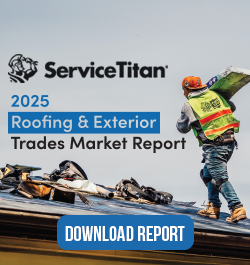









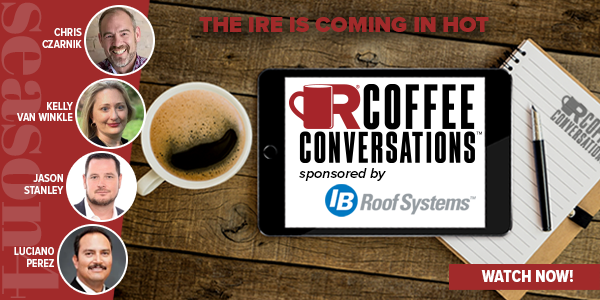
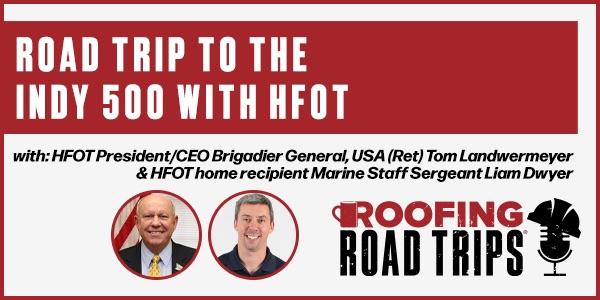
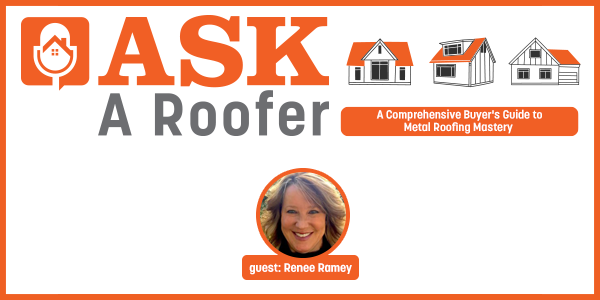
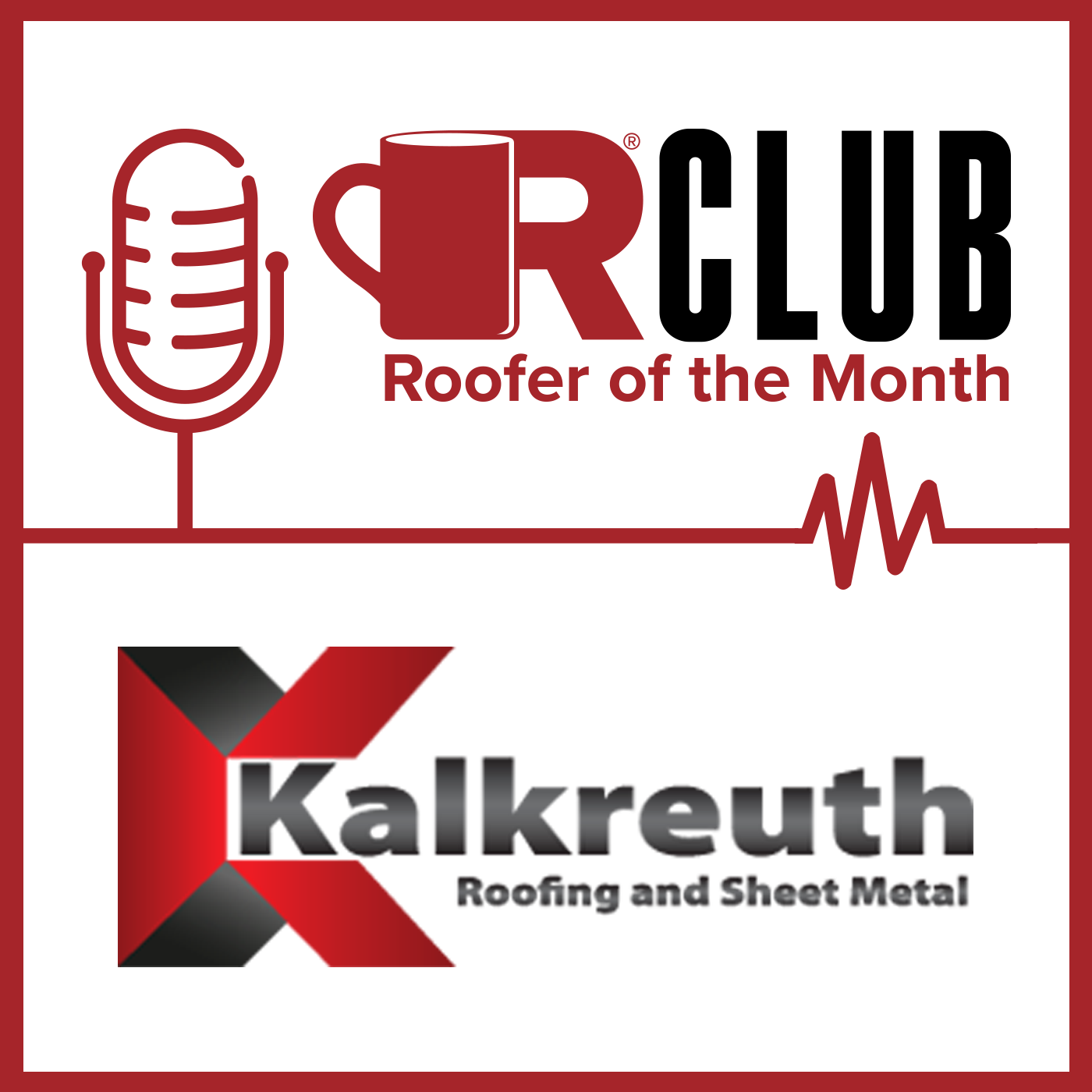


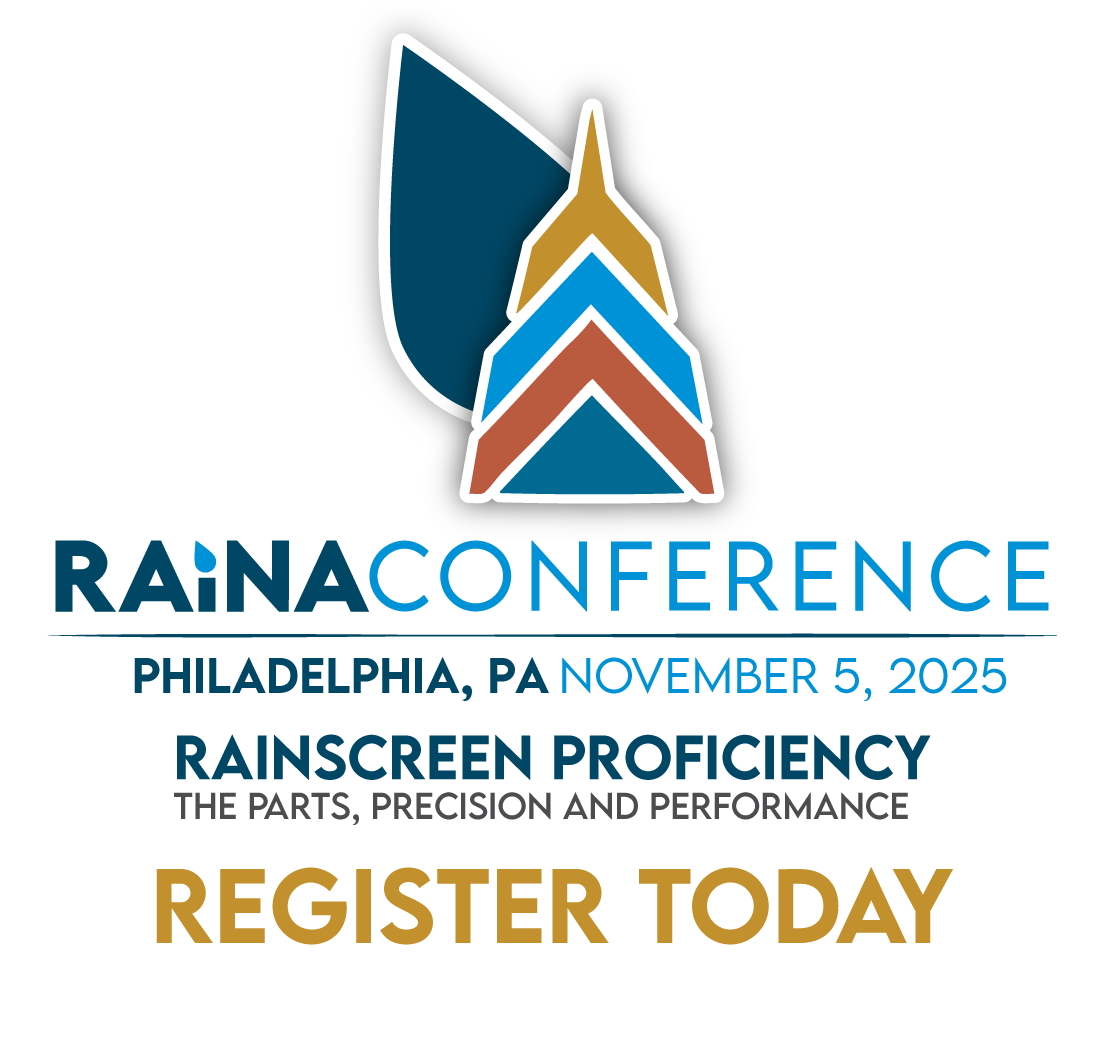

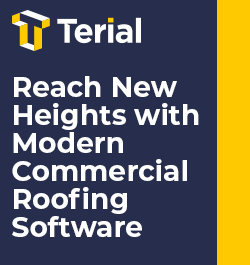
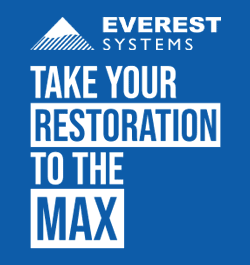
Comments
Leave a Reply
Have an account? Login to leave a comment!
Sign In